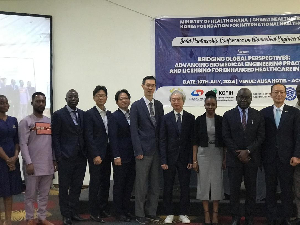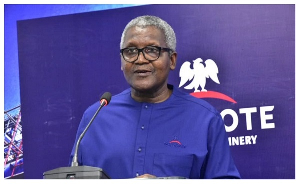The Ministry of Health, Ghana Health Service, and the Korea Foundation for International Healthcare convened for a joint partnership conference on biomedical engineering on July 10, 2024.
Themed "Bridging Global Perspectives: Advancing Biomedical Engineering Practices and Licensing for Enhanced Healthcare in Ghana," the conference aims to integrate the engineering sector with health sciences to meet the growing demands of modern healthcare.
Dr. Darius Osei, representing the Minister of Health, highlighted the critical role of biomedical engineering in the healthcare services of Ghana.
In his address, he stated, “It is an honour to address you today on the critical role of Biomedical Engineering in healthcare services. Although relatively new in Ghana, this field holds immense and promising potential.
“Biomedical engineers are pivotal in bridging the gap between medicine and engineering, enhancing healthcare through the design, maintenance, and management of medical devices.”
Dr. Osei emphasized that modern healthcare relies heavily on advanced technologies and equipment, and biomedical engineers play a vital role in ensuring these technologies are available, functional, and effective.
“Biomedical Engineering applies engineering principles to medical challenges, combining expertise from various engineering disciplines with life sciences to improve healthcare outcomes.
"This multifaceted profession includes specialties such as bio instrumentation, biomechanics, clinical engineering, medical imaging, orthopedic bioengineering, rehabilitation engineering, and biomaterials,” he explained.
He called for advocacy, policy development, and professional growth to establish biomedical engineering within the healthcare sector. He underscored the need for practical training programs to meet the growing demand for skilled biomedical engineers.
The chairman of the program, Dr. Elsie Effah Kaufman, renowned for her role as the National Science and Maths Quiz (NSMQ) Mistress and Dean of the School of Engineering Sciences at the University of Ghana, addressed the challenges faced by the engineering sector, particularly in terms of sponsorship and funding.
“We can learn from this nice story and we can tell our own story in years later. The challenge is that we have been working in isolation.
"The universities have biomedical engineering programs but there is barely any support from anywhere. Sometimes we get told that students are not even fit for purpose, but who is coming to support us? We need the needed support,” Dr. Kaufman stated.
Professor Shin Sang Bum, Director of IPAID at Yonsei University, shared the success story of Korean universities in engineering and called for collaboration between Ghana and Korea to enhance the engineering sector.
On the other hand, Professor Mark Adom Asamoah, former Provost of the College of Engineering at KNUST and current STEM Policy Advisor at the Office of the Minister for Education added, “The importance of this collaboration is that we need to look at how the biomedical engineers we are training are absorbed into the system. We are looking at it in terms of the Ministry of Health.
"We need to create research and innovation hubs for our students at the tertiary level to be able to enhance training in terms of how to produce basic biomedical devices.”
Watch the latest episode of Everyday People on GhanaWeb TV below:
Click to view details



General News of Thursday, 11 July 2024
Source: Ministry of Health

















